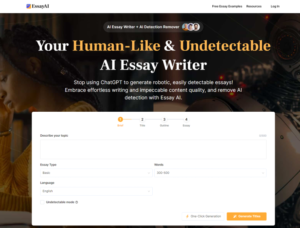In the rapidly evolving landscape of digital tools for education and content creation, EssayAI emerges as a beacon for those seeking assistance in crafting essays that resonate with human quality and originality. This comprehensive review of EssayAI explores how this platform transcends the capabilities of conventional AI essay writers by offering an undetectable AI essay writer solution, designed to bypass AI detectors with ease. Through a meticulous examination, we delve into the intricacies of EssayAI’s offerings, dissecting its functionality, efficacy, and how it stands in contrast to alternatives like ChatGPT.
Unveiling EssayAI: More Than Just an AI Essay Writer
Background
The academic and professional realms demand a level of essay writing that not only conveys clear arguments but also adheres to the highest standards of originality and sophistication. Enter EssayAI, a platform that claims to revolutionize how we approach essay writing with AI technology by addressing a prevalent concern: detectability by AI-detection software such as Turnitin and GPTZero.
Key Features
Bypassing AI Detectors with Advanced LLMs
At the heart of EssayAI’s offering is its promise to bypass AI detectors, making it a potent tool for users who prioritize the undetectability of AI-generated content. Leveraging language models trained on a vast corpus of over 100 million professionally written essays, EssayAI boasts a nuanced understanding of varied topics, which ostensibly allows it to replicate human-like essay writing with unprecedented accuracy.
A Comprehensive Essay Generator
EssayAI positions itself as an all-encompassing essay generator, providing users with the tools to create content that adheres to academic integrity guidelines by ensuring zero plagiarism. Its smart outlining feature further aids in structuring essays effectively, promising a coherent flow and solid argumentation.
Plagiarism-Free, Original Content Creation
In the pursuit of academic excellence, the demand for plagiarism-free content has never been higher. EssayAI reassures its users of the originality of the essays generated, equipped with an in-built AI detector to cross-verify the content against commonly used AI-detection tools.
Rich Resources
EssayAI boasts a broad range of articles aimed at improving essay writing skills. These pieces come loaded with expert opinions and strategies for better writing. If you need assistance with writing an analytical essay, you’ll find guides tailored to help with exactly that.
The Technology Behind EssayAI: How It Differentiates Itself
EssayAI’s technology framework marks a departure from conventional AI writing assistants. The developers underscore the special training and development process of EssayAI, ensuring it can remove AI detection traces typically flagged by verification tools. This undetectable AI essay writer capability makes EssayAI not just a tool for generating essays but a sophisticated partner in maintaining the integrity of academic writing.
EssayAI in Practice: An Undetectable AI Essay Writing Experience
User Experience
Navigating EssayAI is designed to be intuitive, with a step-by-step guide that takes the user from the initial essay brief to the final output. The platform’s uncomplicated interface ensures that even users unfamiliar with AI essay writers can achieve desirable results without a steep learning curve.
Quality and Performance
The ultimate test for any AI essay writer lies in the quality of essays it can produce. EssayAI’s promise to elevate writing quality is not unfounded. Samples generated through EssayAI exhibit a level of depth and cohesiveness that mirrors professional writing, perhaps a testament to its claim of being a human-like AI essay writer.
Bypassing AI Detectors: A Closer Look
A particular area of interest for many users is EssayAI’s ability to create essays that can bypass AI detectors. Through practical tests, essays generated by EssayAI were subjected to popular detection software. The results, intriguingly, uphold the platform’s claim of undetectability, showcasing its effectiveness in mimicking human writing patterns and avoiding common tell-tale signs of AI-generated content.
Addressing Ethical Considerations
While the allure of an undetectable AI essay writer is strong, it invites a broader discussion on the ethical implications of using AI in academic settings. EssayAI, aware of these considerations, emphasizes its role in supporting the writing process rather than replacing it entirely. The tool encourages creativity and insight, offering a co-writing experience that requires substantive user input to guide the essay’s direction.
Conclusion: The Future of AI-Assisted Writing
EssayAI represents a significant step forward in the domain of AI-assisted writing. By providing a platform that marries the benefits of AI with the nuances of human-like essay writing, EssayAI sets a new standard for what technology can achieve in the realm of academic integrity and content creation. Its success in producing undetectable AI-generated essays raises important questions about the future of education, the role of AI in learning, and how we can best harness this technology to enrich our capabilities rather than diminish our efforts.
As AI continues to evolve, tools like EssayAI will likely become more prevalent, offering users innovative ways to approach writing and content generation. However, the onus remains on the users to navigate these tools ethically, ensuring that the pursuit of excellence remains rooted in authenticity and personal growth.







